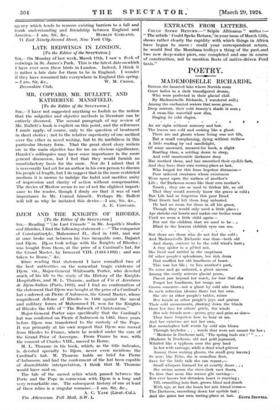MR. COPPARD, MR. BULLETT, AND KATHERINE MANSFIELD.
[To the Editor of the SPECTATOR.] SIR, —I have not suggested anything so foolish as the notion that the subjective and objective methods in literature can be entirely divorced. The second paragraph of my review of Mr. Bullett's book is explicit on this point, and the references I made apply, of course, only to the question of treatment in short stories ; not to the relative superiority of one method over the other in novel 'writing, but to its usefulness in this particular literary form. That the great short story writers arc in the main objective has for me an obvious significance. Hamlet's soliloquies may have some importance in the more general discussion, but I feel that they would furnish an unsatisfactory basis for the conte. Nor do I admit that it is necessarily bad art for an author in his own person to discuss his people at length, but I do suggest that in the more restricted medium it is unwise to indulge the habit and sacrifice unity of. impression and clarity of action without compensation. The device of Marlow seems to me of not the slightest import- ance to the reader, though I dimly see that it was of vast importance to Mr. Conrad himself. Perhaps Mr. Bullett will tell us why he imitated this device.—I am, Sir, &c., A. E. COPPARD.










































 Previous page
Previous page